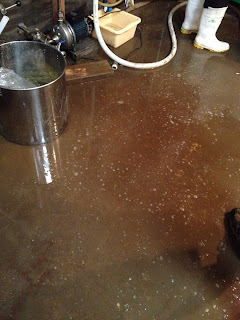It’s been a
little over three months since we seriously decided to take our home brewing endeavors
to the next level and become true professionals. Alan Knight already works as the Master Brewer
at Wild on Waiheke
where he makes damn fine beer.
(and has
done for the last fifteen odd years), but for the rest of us, who have only ever
seen our beer consumed and enjoyed by our nearest and dearest, it’s all very
exciting.
There are a lot of hoops one has to jump through to actually get set up as a brewery. We
talked to the Auckland Council, but they
seemed not to really know what a brewery really was or what it did. They had
regulations for brothels (which are legal here) and undertakers, kitchens and
jam makers, but not for breweries. So we did everything they asked us to do
despite the fact that they were treating us as “food preparation” and clearly had no idea what we should
actually be doing, which is odd when you consider that New Zealand has around 60 microbreweries so this can’t be the
first time it has come up.
I know for a fact that any brewery would be a lot more
sterile than required under the Food Hygiene Act (they have guidelines for the acceptable level of rat faeces in food - when making beer than you can’t allow any). It would become infected and
utterly undrinkable, but I digress.
We went and
talked to customs who wanted to sight a scarily gargantuan bond but who were happy
for us to proceed.
And so, if
all goes according to plan, The Ale Brewing Chaps, as we shall now be known,
will make our debut appearance at The Auckland Beer Festival 2013
Here’s what
happened last year
Yeah. Shit got crazy.






